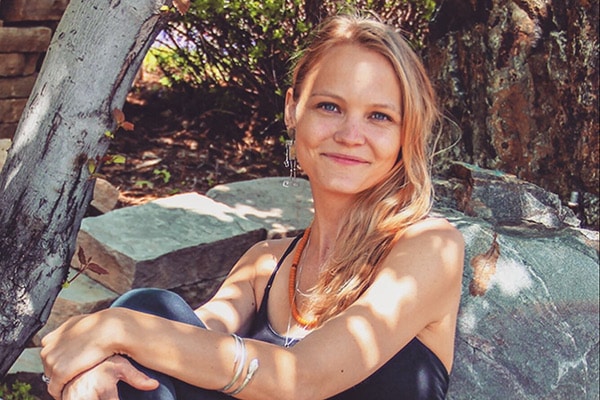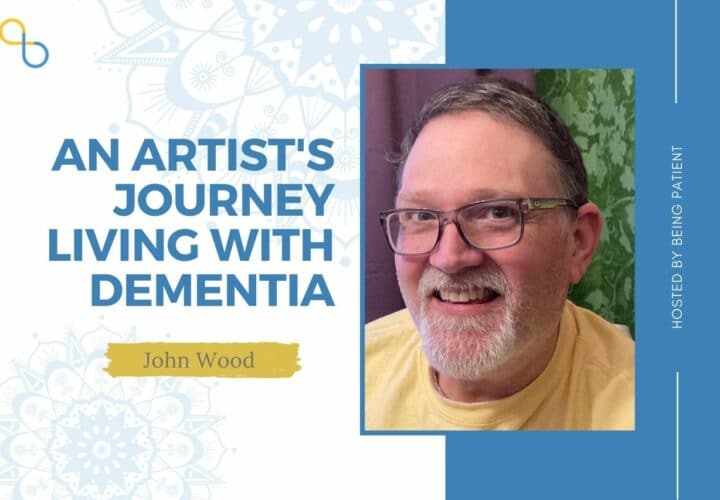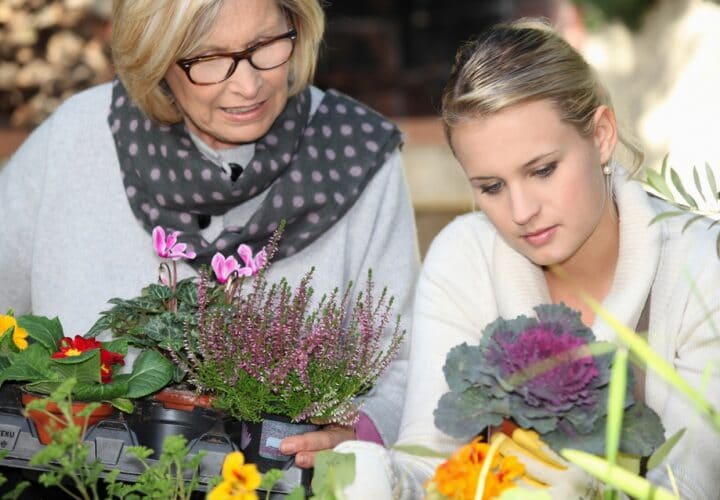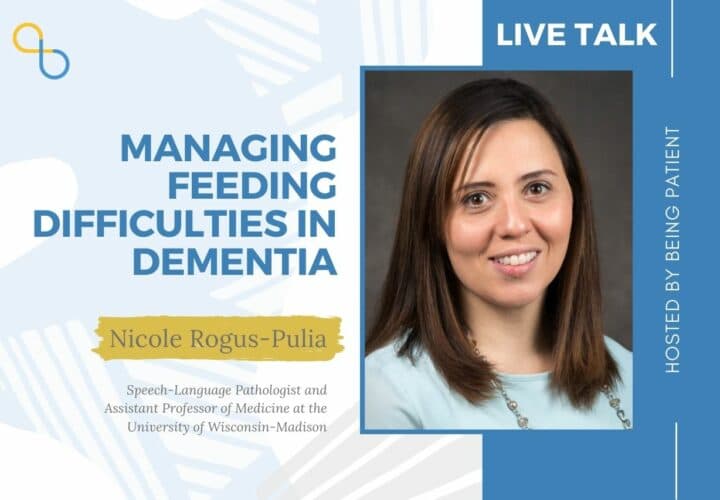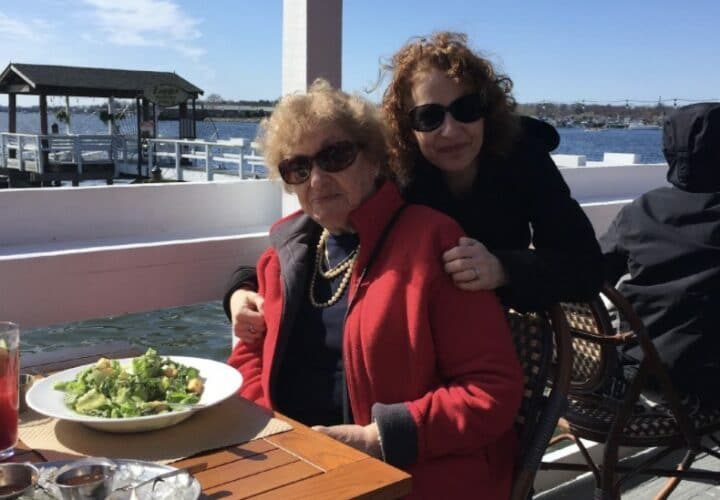Interfaith Hospice Chaplain Ellie Douglass discusses her approach to caregiving through creative listening, mindfulness and respectful language.
Caregiving for a person who is nearing the end of their dementia journey is a challenging role, whether someone is doing it professionally or for a family member. For Interfaith Hospice Chaplain Ellie Douglass in Colorado, a holistic, creative approach to caregiving helps her embody mindfulness. She believes this approach can help other caregivers do the same — and find their own comfort in the process.
For the past five years, Douglass — also an artist and poet — has worked in hospice care, providing spiritual and emotional support to people nearing the end of life, including those in memory care units, living with late-stage dementia. She also provides support to loved ones and families.
In a recent conversation with Being Patient, Douglass shared wisdom on how to become a more present and creative listener, how to integrate mindfulness into caregiving, and how to meet your loved one in the moment, instead of relying only on memories of the past.
Being Patient: Generally speaking, how do you integrate your personal creative practices into working with people with Alzheimer’s and dementia?
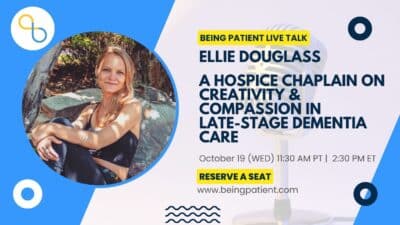
Ellie Douglass: The way that I relate on a creative level is through compassion and being present with the individual with dementia and by employing creative listening. We are compassionate, we lean in … and let them know that they’re not alone […]. When we’re truly present, we can listen with the inquisitive curious mindset. That’s where creativity comes in.
I’ve witnessed over the years that individuals
who have dementia still rely on the metaphors or the symbols or the more non-linear, spontaneous aspects of the mind, which I have found to be quite interesting and beautiful as they’re processing their life. And so when I’m listening, I’m always aware to listen for what’s being said beneath the surface.
Being Patient: Can you talk a little bit more about that using presence to find metaphors when speaking to people?
Ellie Douglass: Some examples of things I’ve heard over the years with individuals who have various degrees of dementia — I’ve heard phrases like “I’m waiting to get on the train,” or “I need to put my boots on one last time,” or “I’m ready to swing into the other world.” In order to almost describe something that’s so intense, I find that the mind does rely on metaphor.
The way that I listen differently all began with this man that I cared for; he lived in a memory care unit. He had multiple strokes and had been living in memory care for a long time and was now on hospice care. He was always asleep in his recliner chair. One day I decided to wake him up, and when I woke him I asked him: How are you doing? He woke up and he looked out the window and he said:
“I’m just sitting here, daydreaming, as I look over the sky of my life. I see all this doing, needing to decide this and that, which college I should attend, but I find it’s quite nice to just sit and watch and maybe even take an afternoon nap.”
In this relationship, I was so taken by his processing, and really from that day forward, I started to listen differently — I started to listen more like an artist or a poet.
Being Patient: That quote is really stirring. It reminds me of this idea that you as the caretaker or anyone who’s spending time with someone, we can really be learning more from their perspective. Modern life is so — you’re always making decisions, on the grind. I’m inspired by your ability to be present in that moment and take and learn from the person that you’re speaking to.
Ellie Douglass: I feel that is so essential in our care for individuals with dementia to remember that the relationship is still reciprocal. There’s still so much to learn. Wisdom does shine through. We don’t know everything about consciousness. There can be these really beautiful moments that we need to pay attention to. When we are present and compassionate, and willing to be curious, we offer a container and a way for those moments to show up.
“There’s still so much to learn. Wisdom does shine through.
We don’t know everything about consciousness. There can
be these really beautiful moments that
we need to pay attention to.”
Being Patient: I’m really interested in that process of active listening. It reminds me a lot of mindfulness, and you said you’ve worked with mindfulness. Is that where you began to draw this practice from?
Ellie Douglass: I received my Master’s in Divinity at Naropa, and my training in contemplative practice helped me right away when I was sitting with someone who had dementia. The work was showing up right there. Here I was with someone who is nonverbal or someone who had a different, unconventional cognition. It was my task to be present. Present and curious about their moment.
Being Patient: For someone who is new to caregiving, how would you suggest leaning into that process?
Ellie Douglass: I think people get quite intimidated by this idea of mindfulness and meditation. Mindfulness is really in essence just the act of noticing. So in this moment, you notice yourself in your seat, you notice your breath or the way the light is coming through the window. You just practice noticing. That brings you into the present moment.
“Someone with dementia is in the moment, so you
meet them in the moment. And you can help them,
and you can help yourself, do that by noticing your
senses or the environment around you.
That’s how you can relate.”
And then when we start practicing in these simple ways, noticing how we are feeling, noticing the breeze, then we bring that into our caregiving space. Someone with dementia is in the moment, so you meet them in the moment. And you can help them, and you can help yourself, do that by noticing your senses or the environment around you. That’s how you can relate.
Being Patient: I love that, that reminds me of something you said in the materials we exchanged before this about being with the person in the moment they are in now, versus holding onto who they once were. How have you figured out ways to push the past away in your practice?
Ellie Douglass: It’s of course really difficult. Dementia is one of the most heartbreaking conditions we face as humans. I do think that there is a gift in it where this individual, their memory is more fluid and the past is not as present. And so the most compassionate thing you can do as a caregiver is to meet your loved one in the moment. Sometimes we can be so much energy, have so much energy directed towards the past that we’re clinging to it. We’re causing more suffering for ourselves and potentially our loved one, because we’re not able to actually be present to them in the moment. So hopefully that helps.
Being Patient: You talked about ways you’ve taken these traditional methods of looking at dementia and coming up with new frameworks to discuss it. The other one I was really interested in was taking this oft-used phrase salad speech, and you came up with a new way to discuss that, and refer to it. Could you talk a little bit about that?
Ellie Douglass: With that story I told earlier about the man that I woke up, he was really the inspiration or this. A common medical term we use to describe the speech of dementia is word salad speech. I didn’t really like that, it made me feel uncomfortable in a sense, so I quietly came up with my own phrase, which I call “formless speech.” The individual with dementia, their speech is more formless. I feel like that phrase still holds dignity and wonder and more humanity than some of the more medical phrases we use.
Being Patient: I love that you’re finding these ways to bring it into practice and help people change the way they’re talking — change the terminology. Have you found any other ways to bring that dignity and honor into your practice, things that maybe the average person could bring into their interactions with people with dementia?
Ellie Douglass: I really just listen differently. I listen with an inquisitive ear, and I often write down these phrases or things I hear that I want to be with and contemplate more. Writing down the speech of individuals who have dementia has been really healing for me in the sense that I now have multiple people’s words memorized and so they stay more alive in my heart. It can be really helpful for the grief journey to be able to relate to our loved one, write down their speech, I also just encourage having creative practice too. The journey of caring for someone with dementia is more nonlinear and ambiguous.
“A common term we use to describe the speech of
dementia is word ‘salad speech.’ I didn’t really like
that, it made me feel uncomfortable in a sense, so
I quietly came up with my own phrase, which I call
‘formless speech.’ The individual with dementia, their speech
is more formless. I feel like that phrase still holds dignity
and wonder and more humanity than some of
the more medical phrases we use.”
Being Patient: Do you have any suggestions for how someone would start on that journey as a caregiver?
Ellie Douglass: I like to think that creativity is a pretty broad term. I believe that we all are naturally creative. We just have to lean back into it. You probably were creative as a child and maybe you put some things down at some point in your life. Maybe engage with something creative with the intent that you know it’s going to be beneficial for your own healing. It can be something as simple as drawing, it doesn’t have to be good. You can write poetry, just really offer yourself space during your experience of caregiving to contemplate and relate to your experience in a more nonverbal way. It can even be dancing or listening to music or engaging in the arts in some way.
“I believe that the mind is naturally creative
and that we’re making meaning until the day we die,
and I’ve witnessed this in people who have dementia.
They’re still making meaning. They’re processing their
experience, their reality, their life and their death.”
I believe that the mind is naturally creative and that we’re making meaning until the day we die, and I’ve witnessed this in people who have dementia. They’re still making meaning. They’re processing their experience, their reality, their life and their death. There’s a quote I love: “Memory is a poet, not a historian.” I really invite people to be inquisitive, to listen for metaphor or symbol, and to know that there is a process happening that we can attune to with our loved one with dementia.
Edited for length and clarity.
